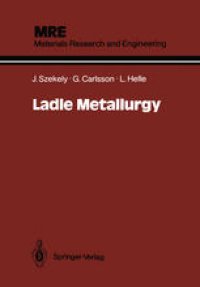
Ebook: Ladle Metallurgy
- Tags: Characterization and Evaluation of Materials
- Series: Materials Research and Engineering
- Year: 1989
- Publisher: Springer-Verlag New York
- Edition: 1
- Language: English
- pdf
This book seeks to provide a comprehensive coverage of the important and growing field of ladle metallurgy, including theory, practice, and economics. During the past decade, major advances have been made in the secondary metallurgy of steel and other metals; indeed, secondary metallurgy, that is, the ladle treatment of molten metals, following the melting and refining steps, has become an important and inevitable part of the overall processing sequence. Ladle metallurgy is attractive because it can provide an effective means for adjusting and fine-tuning the composition and temperature of the molten products prior to solidification processing. Ladle metallurgy allows us to produce materials of very high purity and will become increasingly an essential process requirement. Indeed, many of the novel casting techniques will mandate steels of much higher cleanliness than those in current practice. Of course, ladle metallurgy or secondary metallurgy is not limited to steel; indeed, major advances have been made and are being made in the secondary processing of aluminum, aluminum alloys, and many specialty metals.
The purpose of this text is to introduce the reader to the science, practice and economics of ladle metallurgy. In recent years ladle metallurgy has become an important component of the overall ironmaking/steel processing operational sequence. Indeed, some form of ladle treatment has become indispensable in modern steelmaking practice. This book provides a comprehensive description of ladle metallurgy practice, together with the underlying fundamentals and the process economics. The material provides a synthesis of recent published information on the subject. The combined expertise of the authors, including academic, industrial research and steelmaking operations provides a balanced view of this important subject.